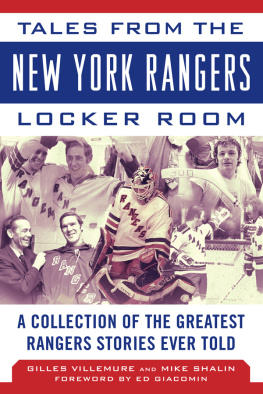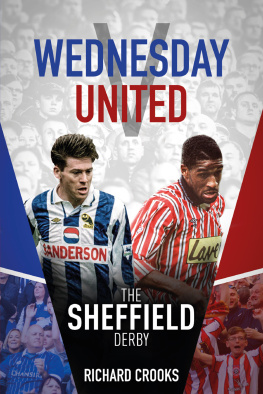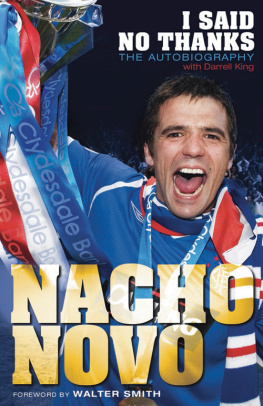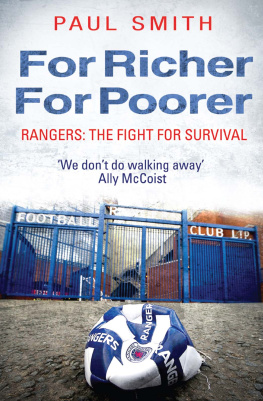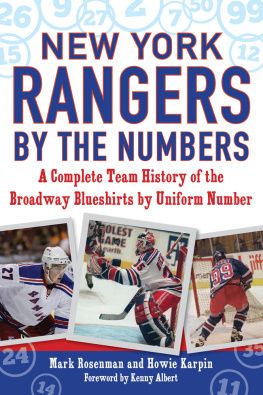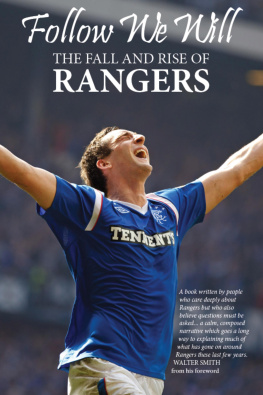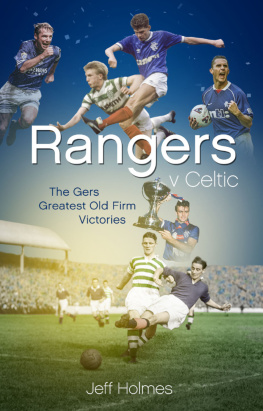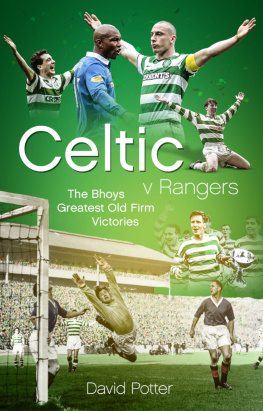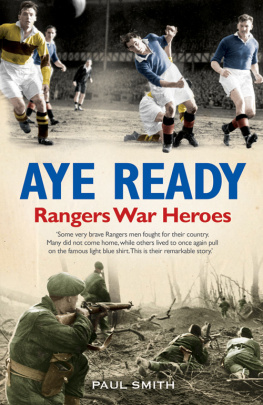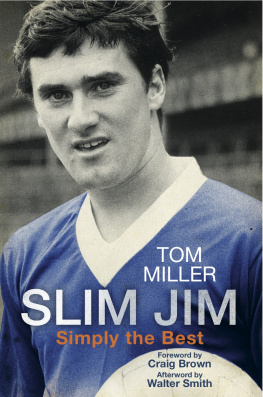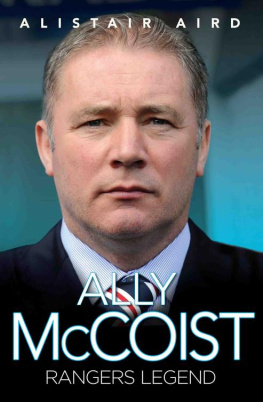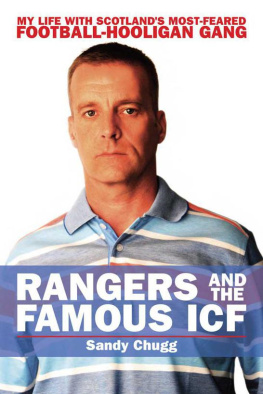
Published by Canongate Books in 2012
This digital edition first published by Canongate in 2012
Copyright Richard Wilson, 2012
The moral right of the author has been asserted
First published in Great Britain in 2012 by Canongate Books Ltd, 14 High Street, Edinburgh EH1 1TE
www.canongate.tv
British Library Cataloguing-in-Publication Data
A catalogue record for this book is available on request from the British Library
ISBN 978 1 84767 838 6
eISBN 978 1 84767 967 3
Book design by Cluny Sheeler.
Typeset by Palimpsest Book Production Ltd, Falkirk, Stirlingshire
For Pam, who makes anything seem possible and without whom I would be lost; and for Amelia and Christopher, who may never truly know just what they mean to us
LIST OF ILLUSTRATIONS
ACKNOWLEDGMENTS
This book began several decades ago, when I took from my father, Jack Wilson, a love for football. Growing up in Glasgow, then becoming by way of one or two detours a sports writer in the city, the Old Firm have seemed ever-present in my life. I share an obsession with these two clubs Rangers and Celtic with hundreds of thousands of people, and yet it somehow remains personal. Perhaps the need was always there to address the rivalry, at least as I see it, and so this is an attempt to look at the derby match from the inside, from the perspective of all the different people involved. I chose one Old Firm game at random (the first one that was played after I found a publisher), and happened upon the fixture at Celtic Park on 3 January 2010. This is as comprehensive a study of that game as it could be, but inevitably there were participants who did not wish to contribute.
So the book is an amalgam of original interviews, meticulous research, and some literary licence. The passages in italics that intersperse each chapter are dramatic representations, informed by the people I have spoken to for the book and during more than ten years of covering the Old Firm for various national newspapers. They are an attempt to bring to life what it is like to be in the midst of these games and their aftermath. Throughout the book, where people are quoted directly, the remarks come from interviews or research. Any other quotes are dramatic dialogue, informed but recreated. So much is written and said about the players and managers involved that I wanted to explore the other individuals drawn into the game, but I felt that any Old Firm book still needed to include the experiences of the football men. The purpose is not to present a history of the Old Firm some unsurpassable books have already been written on this subject or to glamorise it, but to try to understand it. They are compelling matches, for all their controversies, and I have attempted to capture how they impact on those involved.
During the writing of the book, season 201011 reached a crescendo. Seven Old Firm games were played in one season, several red cards were shown, along with too many yellow cards to mention; there were touchline altercations, political ramifications and, worst of all, bullets and parcel bombs sent to the Celtic manager, Neil Lennon. Suddenly, the game seemed belittled by the social and cultural aspects that surround it. This derby match should be celebrated for its colour, its passion, and its intensity but there are times when it leaves you cold and forlorn. I hope all of these sentiments are reflected in the book, but also the faith that what makes the game so special will outlive the worst of its excesses.
I am indebted to numerous people and organisations, and if I happen to miss any out, then please accept it as a lapse rather than a slight. In no particular order, I could not have written this book without the following: Carol Patton, Iain Jamieson, Michelle Watt, Jennifer Brophy, Martin Murray, Nigel Tilson, Rob Shorthouse, Wayne Mawson, Darryl Broadfoot, Hugh Dallas, Professor Tom Devine, Michael Grant, Bill Murray, Dave Allan, Marc Chaplain, Caireen Kelly, Jonathan Sim, Alex Henderson, Jamie Watt, Eamonn Hewitt, Dr Michael Sheridan, Gerry McDade, Paul Brennan, David Edgar, Professor Graham Walker, Richard Gordon, Ian Crocker, Professor Steve Bruce, Harald Brattbakk, Darrell King, Donald Cowey and Jonathan Jobson; but also every Old Firm player and manager I have spoken to during my career. It is often a fraught relationship between football and the media, but almost without exception I have learned something from all of you.
I am fortunate to have enjoyed access to an extensive newspaper database, with the most helpful sources of material and insight often being the Scottish press, including the Herald, the Sunday Herald, the Scotsman, Scotland on Sunday, the Daily Record, the Sunday Mail, the Scottish Sun, the Scottish News of the World, the Scottish Daily Express, the Scottish Sunday Express, the Scottish Daily Mail and the Scottish Mail on Sunday, but other newspapers were also useful. In addition, the following resources were consulted: Sectarianism in Glasgow by NFO Social Research; Challenging Sectarianism in Scotland: The Prism of Racism by Elinor Kelly, as well as several books, including: The Old Firm and Bhoys, Bears and Bigotry by Bill Murray; Voices of the Old Firm by Stephen Walsh; Sectarianism in Scotland by Steve Bruce; Butcher: My Autobiography by Terry Butcher; Hail Cesar: The Autobiography by Billy McNeill; John Greig: My Story; Shooting Star: The Colin Stein Story; Gazza: My Story by Paul Gascoigne; Graeme Souness: A Managers Diary; and The Management by Michael Grant and Rob Robertson. Several radio and television programmes were also helpful, including Alternative Histories of the Old Firm and Managing the Old Firm on BBC Radio Scotland, and Neil Lennons interview on RTEs Saturday Night With Miriam.
I should mention that for all things Rangers I continue to cherish the impassioned conversations of Craig Wilson, Euan Dow and Chris Cole, with the occasional, but always distinctive, input of Neil Anderson. For Celtic, there are few more informed, or worthwhile, opinions than those of Andrew H. Smith and Hugh MacDonald. All are friends, but I value our football chats, too. This book would not exist without the support and belief of David Luxton, my agent, who is never short of encouragement or, indeed, patience. The same applies to all at Canongate, for whom it has been a pleasure and an honour to write. Dan Franklin was the first person to share my own level of enthusiasm for the idea, then Nick Davies was a source of endless improvements. Norah Perkins has always been a beacon of positivity, while Sen Costellos editing was meticulous, insightful and helpful. All played a part in transforming the book from a vague idea and some rough writing, but the same should be said for Neil White, a friend and colleague whose initial eagerness provided the impetus to take the book on, but also provided some much-needed cheer at a difficult time.
Finally, I would like to take the opportunity to say thanks to my father, for many things that do not need to be said, but also for driving me to football training and matches several times a week when I was a boy, and for standing on the touchline of some run-down park, in all extremes of weather, to watch me. You never knew how reassuring that was. Sometime very early on, the game became our connection, which is why it means so much to me now. I also owe more than gratitude to my wife, Pam, and my two children, Amelia and Christopher. You put up with the unsociable hours, the holidays spent immersed in researching and writing, the stress of trying to meet the deadlines, but never without a word of support or love. I couldnt have felt alone, because you continue to be my greatest inspiration, but I often felt selfish. I hope that in some small way, the book was worth it. Your opinion is, always, the only one that matters. Thank you, for everything.
Next page

